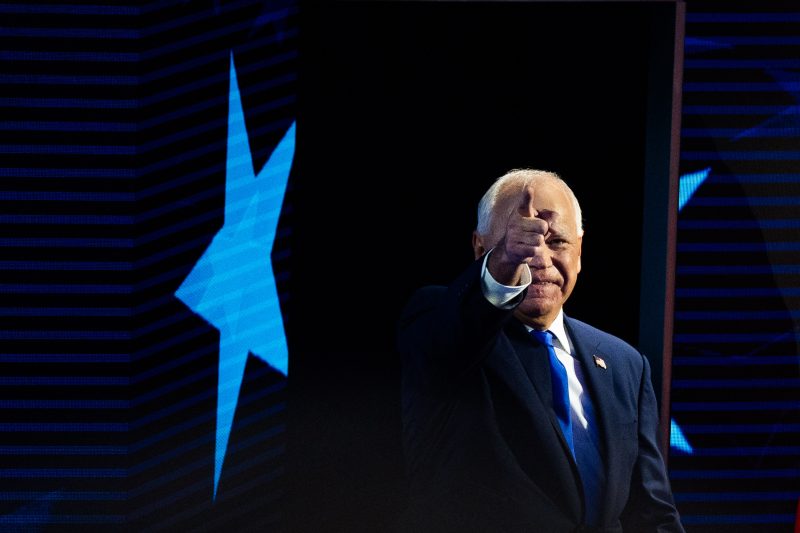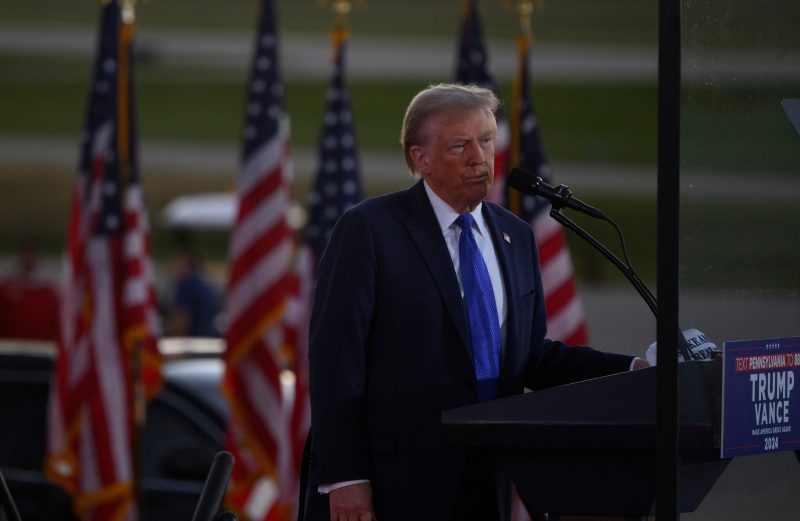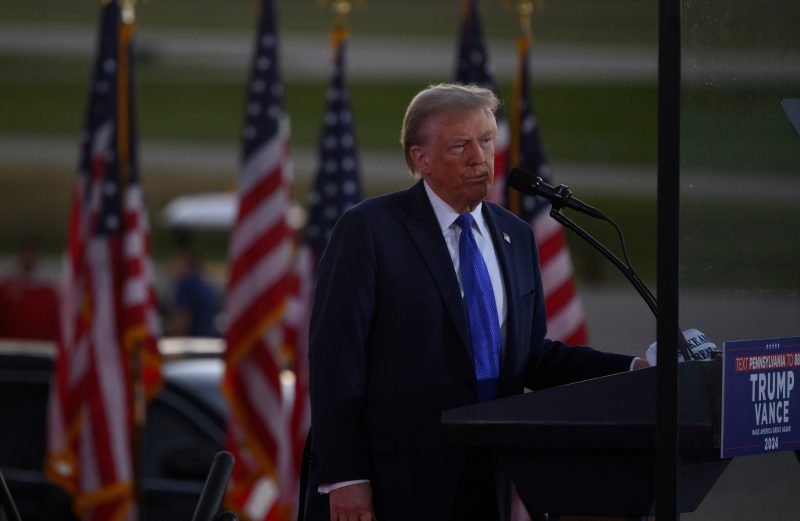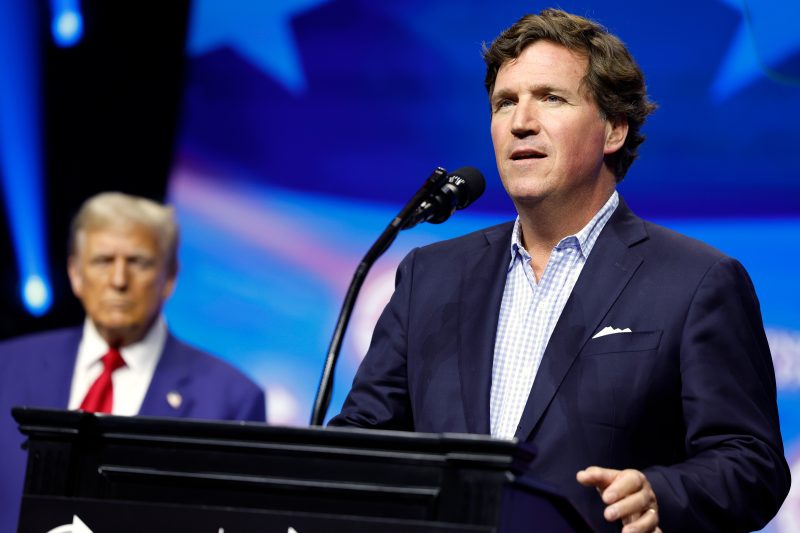
‘Tampon Tim’ is looking more like Teflon Tim
CHICAGO — More than a few moderate Donald Trump critics were puzzled and concerned by Vice President Kamala Harris’s selection of Minnesota Gov. Tim Walz (D) as her running mate. And Walz’s liberal-leaning record as governor — at least compared to other finalists — has combined with controversies about his biographical claims to give Republicans real fodder.
Shortly after Walz’s selection, Trump even professed to being “thrilled” by what Republicans suddenly had to work with.
But more than two weeks later, as Walz took the stage to accept his party’s VP nomination here Wednesday night, both the fears and the thrill (for Trump) have faded.
Despite plenty of incoming — Republicans have at times seemed more intent on attacking Walz than Harris — Walz is a popular running mate. He’s significantly more popular than Trump running mate Sen. JD Vance (R-Ohio), a historically disliked VP pick who has wilted in the face of scrutiny.
And Walz’s speech — which included a touching moment when his son, Gus, pointed and said “That’s my dad!” — was well received. It seemed likely to rally Democrats to a pick that some were uncertain about.
So far it’s gone well for Walz. But why? Why has the candidate Republicans have tried to label “Tampon Tim” looked more like Teflon Tim?
First, a look at the numbers. A new AP-NORC poll Wednesday showed more Americans liked Walz than disliked him (36 percent favorable to 25 percent unfavorable). That’s compared to Vance’s double-digit negative ratings (27-44).
A Washington Post/ABC News/Ipsos poll over the weekend showed a slightly less pronounced gap, but a sizable one nonetheless: Walz nine points positive, and Vance 10 points negative.
Other polls have been less strong for Walz, but he hasn’t been underwater in even one quality poll, just as Vance hasn’t seen a positive poll in a month.
There’s a real question about just how much Americans might have consumed the hits on Walz on issues like his military service, his family’s use of fertility treatments and his past campaign’s false version of his 1990s DUI arrest; it’s still relatively early.
But Vance’s quick negative turn would seem to suggest that many Americans are paying attention and are willing to ding a running mate about whom they don’t like what they hear.
A big part of the problem for Republicans would seem to be that they’re casting stones from a glass house.
Their ticket abruptly abandoned any moral high ground on adherence to facts nine years ago, with Trump uttering tens of thousands of false and misleading claims and outright lies since then. Perhaps voters increasingly just assume all politicians inflate their résumés to one degree or another, and Walz’s potential sins are relatively minor.
The GOP’s allegations of Walz’s “stolen valor” might have provided the exception.
But even there, Republicans have severely undermined their own cause.
A Trump campaign letter Wednesday hitting Walz on his claims about his military service — which included his citing a rank he had attained but couldn’t claim in retirement because he hadn’t satisfied the requirements —was signed by 50 Republican lawmakers, but it listed many with “retired” military ranks despite them not having attained retired status. Veterans take these distinctions seriously.
Two of the letter’s signers have faced their own well-substantiated recent allegations of inflating their service; one, Rep. Ronny Jackson (R-Tex.), has claimed the rank of retired Navy rear admiral despite having been demoted in 2022. The letter itself cited rear admiral as Jackson’s current retired rank.
The Trump campaign blamed a “a copy edit mistake made by a staffer” and nixed the ranks from a corrected version. But if it was trying to muddy the waters for its own attack, it surely succeeded.
The handicapping on how Walz would play politically might have missed the root of his potential appeal.
The Midwest has a long history of successful, pretty liberal “prairie populist” Democratic politicians who succeed by cultivating ties with and speaking the language of the working class. Think former Minnesota senator Paul Wellstone, former Wisconsin senator Russ Feingold, former Iowa senator Tom Harkin and Sen. Sherrod Brown (D-Ohio). Democrats maintained a solid foothold in the Dakotas for years with this brand of politics, even as much of the Great Plains had gone red at the federal level.
That breed has seen a sharp decline, as American politics have become more polarized and people vote in an almost parliamentary fashion — viewing a candidate as a vote for one party or another rather than according to their own merits. But it’s not an extinct one.
And Walz has demonstrated a talent for tapping into its ethos. In his speech Wednesday, Walz cited his triumphs in a “deep red” congressional district in southern Minnesota. That’s certainly an exaggeration; his district favored Trump by 15 points in 2016, but it went for both Barack Obama and George W. Bush before then. “Conservative-leaning” would be more apt.
But he did win that 2016 race, even as Trump carried the district by a wide margin. And he survived the 2010 tea party wave in the kind of district that Republicans otherwise cleaned up in.
Plenty of attention has been paid to what Walz did when he was able to pursue a more progressive agenda as governor of a blue-leaning state, and his 2022 reelection win wasn’t as resounding as some other vice-presidential contenders’ most recent races.
But the most gifted politicians can change it up when they need to and be what voters and their party need them to be in a given moment. That populist appeal is clearly what Walz was brought in for. And so far, he seems to be passing that test.



